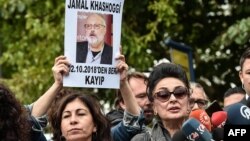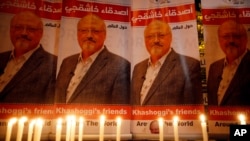Turkey is accusing Saudi Arabia of dispatching agents to Istanbul last month with the express aim of covering up the killing of Saudi dissident Jamal Khashoggi inside Riyadh's consulate.
A Turkish official, speaking anonymously, confirmed a report in Sabah, a newspaper close to Turkey's government, that chemicals expert Ahmad Abdulaziz al-Janobi and toxicology expert Khaled Yahya al-Zahrani were part of a team sent from Saudi Arabia, supposedly to investigate Khashoggi's October 2 killing.
The Sabah report said the two experts visited the consulate every day from their arrival on October 11 until October 17, with Saudi authorities allowing Turkish investigators to search the consulate on October 15.
"We believe that the two individuals came to Turkey for the sole purpose of covering up evidence of Jamal Khashoggi's murder before the Turkish police were allowed to search the premises," the Turkish official said.
Turkey said last week that Khashoggi, a U.S.-based journalist who had written columns for The Washington Post that were critical of Saudi Crown Prince Mohammed bin Salman, was strangled as soon as he entered the consulate, his body dismembered and then destroyed, possibly dissolved in acid.
Khashoggi had scheduled a visit to the consulate to pick up documents for his planned marriage to his fiancee, who waited outside in vain for his return.
No trace of Khashoggi's remains has turned up, even as the 59-year-old journalist's sons appealed on the U.S. television news network CNN on Sunday for the Saudis to return his body so he can be buried in the major Islamic pilgrimage city of Medina with the rest of his family.
Meanwhile, Saudi Arabia told a U.N. Human Rights Council meeting in Geneva that it would prosecute those responsible for Khashoggi's death, but continued to deflect reporters' questions about Riyadh's ongoing investigation. The kingdom's public prosecutor has called the killing premeditated, but has not said who planned or approved it.
Initially, Saudi Arabia said Khashoggi walked out of the consulate and that his whereabouts were unknown, then that he died in a fist fight and still later that he had died in a chokehold.
Bandar Al Aiban, the head of Riyadh's delegation, told the U.N. hearing that King Salman had instructed the Saudi public prosecutor to "proceed with the investigation into this case according to the applicable laws," and "bringing all the perpetrators to justice." Saudi Arabia has detained 18 Saudi nationals in connection with Khashoggi's death, but Aiban gave no details on their status or whereabouts.
"The case is still under investigation, as you know ... I think my statement was very clear," Aiban said.
More than 40 nations, including the United States, called for a thorough investigation of Khashoggi's death and human rights reforms in Saudi Arabia. Numerous Western nations called for the abolition of the death penalty in Saudi Arabia, an end to the system of male guardianship over women and a loosening of the definition of "terrorism" in the kingdom so that peaceful critics are not prosecuted. The Saudis have until Friday to report back on whether they will accept any of the recommendations.
The United States pulled out of the 47-member Human Rights Council in June, accusing it of anti-Israel bias.
But U.S. Charge d'Affaires Mark Cassayre appeared at the meeting in an observer status, saying that a "thorough, conclusive and transparent investigation (of Khashoggi's death) carried out in accordance with due process with results made public is essential."















